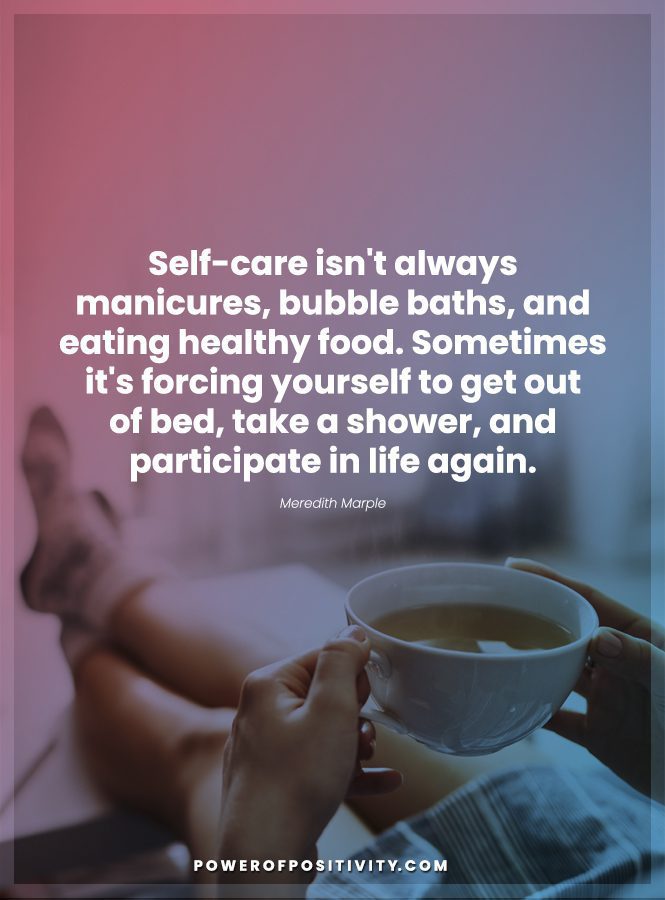How do you manage self care?
You may eat regular meals, go to the gym once a while and even go to church. But many of these things can feel like chores instead of acts of self care. Finding the time to nourish your mind, body and soul is difficult. However, developing self care as a skill can greatly improve your life.
Practicing self care can lead to higher energy levels, less stress, and even possibly lower symptoms of depression and anxiety. These self care tips are designed to cover every facet of your well-being and help you start to lead a more positive, healthy life from within.
12. Make a List of Positive Affirmations
Believing in yourself is the start of everything. When you build greater self-confidence, you’ll be equipped to make decisions, speak your mind and be more vulnerable with people you care about without any fears. Self-affirmations can improve your quality of life by making you more hopeful about the future; optimistic people are happier, healthier, and more productive.
Find the right affirmations for you. Ask yourself what you need most right now. Is it hope, self-love, or just inner peace? There are affirmations online for anything you might need right now.

11. Confront Your Negative Thoughts
Many of us are weighed down by negative thoughts and self-defeating thinking patterns without even realizing it. If you always tend to look on the dark side, your brain is running of neural pathways that make it easier for you to think negatively. To begin thinking more constructively, you must first identify your harmful thoughts.
Learn about cognitive distortions, irrational thought patterns that distort our perception and lead to self-defeating thoughts and symptoms of anxiety and depression.
Self care isn’t always positive. Sometimes, to improve ourselves and grow, we must look deep inside ourselves and address the painful or negative emotions holding us back.
10. Start Breathing Consciously
Meditation teaches us to bring awareness to our breath to bring our center ourselves in the present. Meditation is an ancient art that’s gained new traction over the last year. People worldwide are discovering the healing powers of taking just five minutes a day to live in the here and now.
Living a more mindful life through meditation isn’t about changing who you are or becoming a “better” person; it’s about learning to accept and acknowledge all of the thoughts and feelings that flow through you so you can live free from their control.
9. Make a Gratitude List
A grateful mindset has been scientifically proven to improve your health and happiness. You’re practicing positivity when you try to remind yourself of the good things in your life. Gratitude will help you shift your focus from stress and problems to blessings, no matter how big or small.
Gaining an appreciative attitude toward the earth, others, and yourself changes how we live and relate to others.
8. Spend Time Outdoors
Drink your coffee outside, take a walk during your lunch break and make sure you embrace the sunshine and blue skies as often as possible. One of the most frequent self-care tips people recommend is getting out of your office or home and getting some fresh air. Spending time outside lifts our spirits, raises our Vitamin D levels, and can help us feel more energized. Spending time outdoors is also a great way to connect with nature and feel more in tune with the world.
7. Find New Ways to Exercise
Pounding the pavement (or treadmill) gets old quickly, so break the mold and look for new ways to work out. Not only will you become more social as you take classes, but you can also break out of your comfort zone as you try new things. Yoga is a great low-impact option that can also bring you a lot of inner calm. If you prefer something more uptempo, consider taking a Zumba or kickboxing class.
Regular exercise will make you feel better, benefit your mental health, and even help you live longer. There’s no reason not to work out.
6. Don’t Be Afraid to Say “No”
Many of us fear letting others down or being rejected for speaking our minds. Part of self care is setting personal boundaries and knowing our limits. You don’t have to be forceful and abrasive to speak your mind. If you are around people who constantly make you feel guilty for saying no, it may be time to reevaluate the company you keep.
Saying no to something isn’t wrong, and you’re allowed to decline party invitations, favors, and other requests simply because you don’t want to do them. If you need to prioritize your well-being and mental health, then saying no to will help you free up personal space and stop being overwhelmed with everyone else’s baggage.
5. See a Therapist if You Need One
Everyone can benefit from talking to a counselor. Sometimes, having an unbiased third party listen to our problems can make a difference. There are also warning signs to look out for that indicate you should speak to a licensed mental health professional. The signs of anxiety, depression, OCD, and other psychological disorders are often misconstrued or overlooked by people who don’t understand the conditions.
If you experience prolonged periods of sadness and hopelessness, feel overwhelming fear in social settings or about the future, fixate on things and often feel dominated by your thoughts and other compulsions, a therapist can help. Self care includes getting help and knowing when you can’t fix something alone.
4. Stick to a Sound Sleep Schedule
Adults need at least eight hours of sleep each night to function properly. Sleep deprivation can lead to decreased cognitive functioning, irritability, depression, lack of focus and even physical ailments. If you struggle to stay asleep or wake up rested, first evaluate your environment. Do you tend to stay in bed scrolling on your phone in the dark? Blue light emitted from electronic devices can suppress the secretion of melatonin, the chemical responsible for helping us fall asleep.
Make sure that you create a productive sleep environment. Avoid using your phone at least an hour before bedtime. Focus on doing something relaxing such as meditation and yoga or reading a relaxing book. If you suffer from insomnia, consider asking your doctor for melatonin supplements. You may also find that if you treat underlying problems such as stress or depression, your insomnia disappears.
3. Find a Way to Nourish Your Soul
Spirituality and religion aren’t the same things. You might not find that church does anything for you, but there are plenty of ways to get in touch with your soul. Finding meaning in your life is an important part of self care as it lays the foundation of how you view the world and your place in it. Even if you consider yourself an atheist, you can get in touch with the world and find a way to connect with a greater purpose than your existence.
Many self care tips revolve around physical and mental health. While these are tremendously important, we can’t overlook our souls. Becoming spiritually awakened can help you tap into a side of yourself you never knew existed and feel more in sync with the world.
Practicing things such as yoga and meditation, hiking, art, or other activities that make you feel like you’re actively engaging with the universe is important. Remember, no matter how you believe we all got here, every one of us is made from stars and atoms produced by an incredible and infinite universe.
It’s something to think about.
2. Spend Time With Your Loved Ones
Self care tips don’t stop with just us. To take care of ourselves, we need a positive support system and company that we can rely on. If you have a busy schedule, you might find that at the end of the week, you only want to crawl into bed and hide away for the weekend. Instead of dodging calls and turning down invitations, try to see your friends and family.
You don’t have to do anything extravagant for it to be meaningful. Some of the best memories you can make come from the simplest activities. Plan a potluck dinner party and let everyone bring their favorite dish. Have a Netflix movie marathon or host an impromptu dance party with your go-to Spotify playlist. Every day is filled with plenty of opportunities to bond. For an even more exciting viewing experience, consider using tivimate to explore a variety of shows and movies with friends and family. With its extensive channel lineup and user-friendly interface, tivimate makes it easy to find something for everyone to enjoy together.
1. Trust Your Gut
It can be tough to believe in ourselves, but your instinct guides you throughout life. Relying on instinct builds self-awareness, reflection, and honesty. Our “gut feeling” is an instinctual response that combines learned and unlearned behaviors. We can learn how to sharpen our intuition by asking questions about our feelings, becoming more introspective, and following our hearts.
We hope these self care tips will help you in your life. Remember, self love isn’t a one-time effort. You are in a lifelong relationship with yourself, so remember to invest the time, love, and attention in you that you deserve.




















